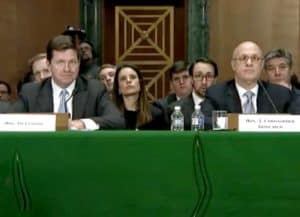Several news reports this month have pointed to a slowdown in the crypto token issues that have been used to finance early stage companies, and the reports predicted that the increased regulatory activity echoing around the globe will serve as a deterrent to further growth. It’s easy to point to regulators and accuse them of bearing down needlessly on meaningful innovation. However, if we shed this overly simplistic point of view and remember that a primary mission of regulators is to protect consumer rights, we can see a future that provides investors with greater opportunities and protection to invest in the nascent space.
Looking at the exuberance of the cryptomarket over the last year, it’s clear why regulators have decided to pay much closer attention and more proactively enforce regulation. ICOs have raised billions of dollars, many of them raised on  marketing and promises alone and no viable product. Scams have proliferated, and many people have lost their money participating in bogus fundraising.
marketing and promises alone and no viable product. Scams have proliferated, and many people have lost their money participating in bogus fundraising.
Even legitimate attempts to develop innovative new products can carry more risk than what is typically visible. The crypto space is filled with inexperienced entrepreneurs who may have a deep understanding of blockchain, but know little about creating a viable business model and building a business. Traditional funding methods would smoke these well-intentioned but ill-equipped players out, but crowd-sourced type funding via ICOs has given them the means to raise previously unthinkable amounts of money.
Experts in the space see the need for change. As Sam Lee, director of research at ICO advisory firm Strategic Coin recently told Reuters:
“We believe that regulation in the ICO space will filter out some of the nonsense in the marketplace and is part of the overall maturing of the crypto asset class.”
U.S. authorities are responding. However, the sometimes disparate positions adopted by politicians and regulators have created confusion for those operating in the crypto space.
The SEC has indicated that it views all initial coin offerings (ICOs) as securities sales. Wyoming passed a bill that exempts certain ICO fundraising from securities laws by carving out a space for tokens with utility-like characteristics.  And the CFTC has said it looks at cryptocurrencies as commodities. Meanwhile, several newly formed organizations are attempting to roadmap new regulations that treat cryptocurrencies and tokens as the unique entities they are rather than to shove them into pre-existing categories.
And the CFTC has said it looks at cryptocurrencies as commodities. Meanwhile, several newly formed organizations are attempting to roadmap new regulations that treat cryptocurrencies and tokens as the unique entities they are rather than to shove them into pre-existing categories.
There are several meaningful takeaways from all of this regulatory news.
One is that undoubtedly, more aggressive enforcement of regulation is coming. Additional regulatory activity may still come in inconsistent and unpredictable waves. Nonetheless, companies active in the crypto capital markets need to tread carefully and consider the consequences of their past actions or when planning future capital raising exercises.
New, second-wave companies seeking to issue crypto tokens have an advantage over earlier token issuers that infringed upon regulations. For example, early-stage companies in the U.S. that issue compliant security tokens will be able to fully focus their time and resources on building their business platforms, rather than be forced to contend with costly regulatory remediation programs.
 Another key takeaway, and one that should be welcomed by entrepreneurs and investors, is that the regulatory movement absolutely has not quashed innovation.
Another key takeaway, and one that should be welcomed by entrepreneurs and investors, is that the regulatory movement absolutely has not quashed innovation.
One of the more interesting and promising applications of blockchain technology, the security token, was actually born out of the recent pressure exerted by the regulators. The relevancy of the security token is its enormous potential to disrupt the traditional capital markets.
Enforcement actions in the U.S. are pushing companies away from ICOs featuring non-compliant utility tokens. Companies and their advisers are adapting and, as a result, there is a growing trend toward compliant security token issues such as those allowed under Regulation D of the U.S. Securities Act of 1933.
At this point, we know that greater enforcement of regulation is coming. While the timing of individual actions by the different regulatory agencies is unpredictable, what is certain is that the regulators will move when they find infractions of the law. We have also seen that innovation in a well regulated environment is possible, and it should protect consumers.
The cryptocurrency and digital capital markets have enjoyed a meteoric rise. Recent action by regulators is logically pushing both to their next stage of evolution, during which best corporate practices and regulatory compliance are crucial to a prosperous future. All companies, whether first movers who have already completed an ICOs or the coming second wave of security-token issuers, must accept the reality of greater regulatory enforcement and embrace the common goal to promote sound practices that benefit all legitimate stakeholders.
 Gene Grant is a founder and CEO of VRBex, a cryptocurrency exchange based in the U.S., led by financial-services professionals. Grant has a twenty-eight year career in financial services and a lifelong entrepreneurial edge. Most recently a Managing Director at the global bank BBVA, Gene has balanced a career that included senior roles at global banks, seven years as a senior member of a specialist derivatives consultancy, and a period as a floor trader on the New York Futures Exchange. As an entrepreneur, Gene started his first business at the age of 14, received a patent at 21, and at 29 he founded and listed an early stage company on the AIM division of the London Stock Exchange.
Gene Grant is a founder and CEO of VRBex, a cryptocurrency exchange based in the U.S., led by financial-services professionals. Grant has a twenty-eight year career in financial services and a lifelong entrepreneurial edge. Most recently a Managing Director at the global bank BBVA, Gene has balanced a career that included senior roles at global banks, seven years as a senior member of a specialist derivatives consultancy, and a period as a floor trader on the New York Futures Exchange. As an entrepreneur, Gene started his first business at the age of 14, received a patent at 21, and at 29 he founded and listed an early stage company on the AIM division of the London Stock Exchange.


